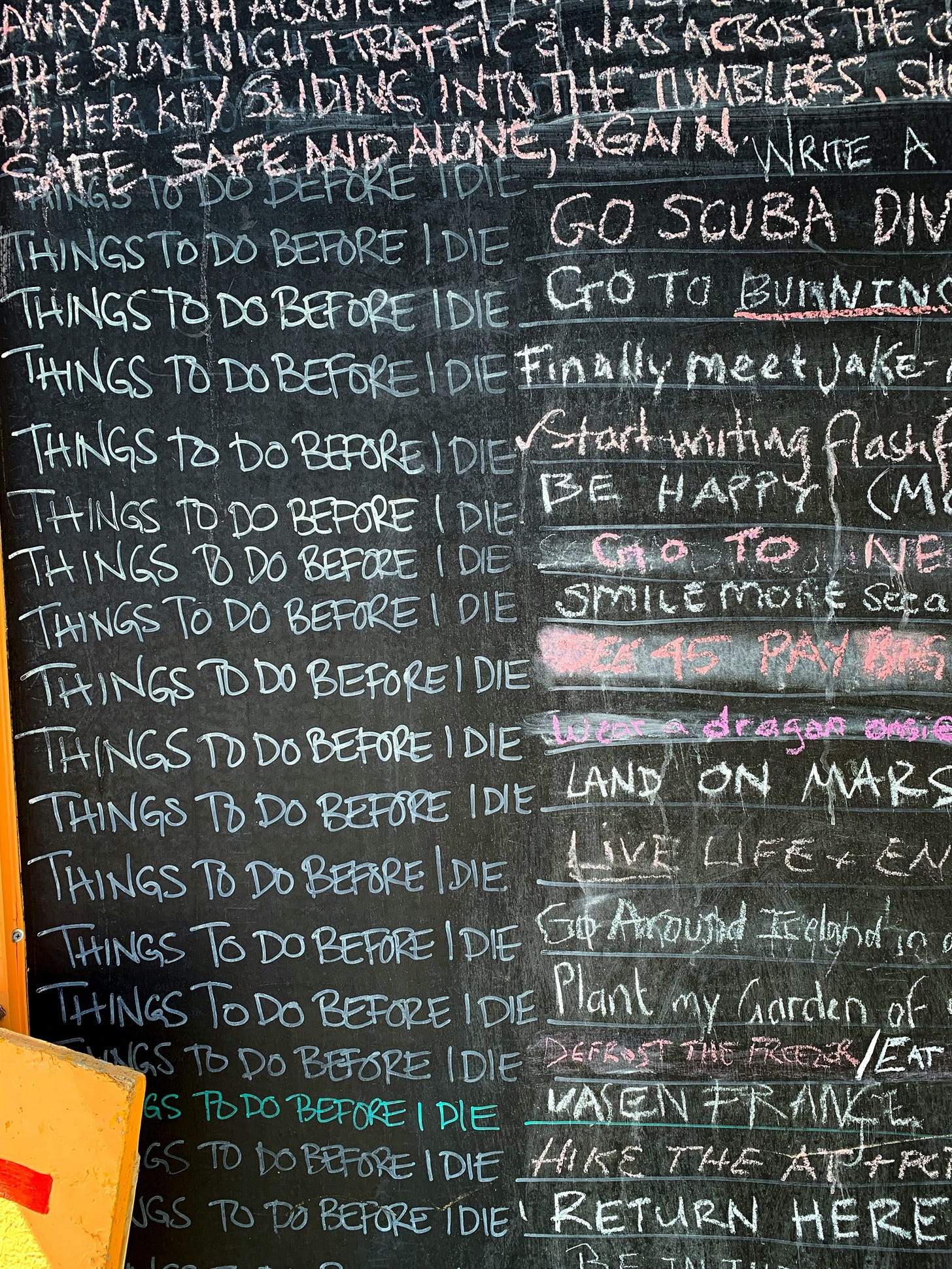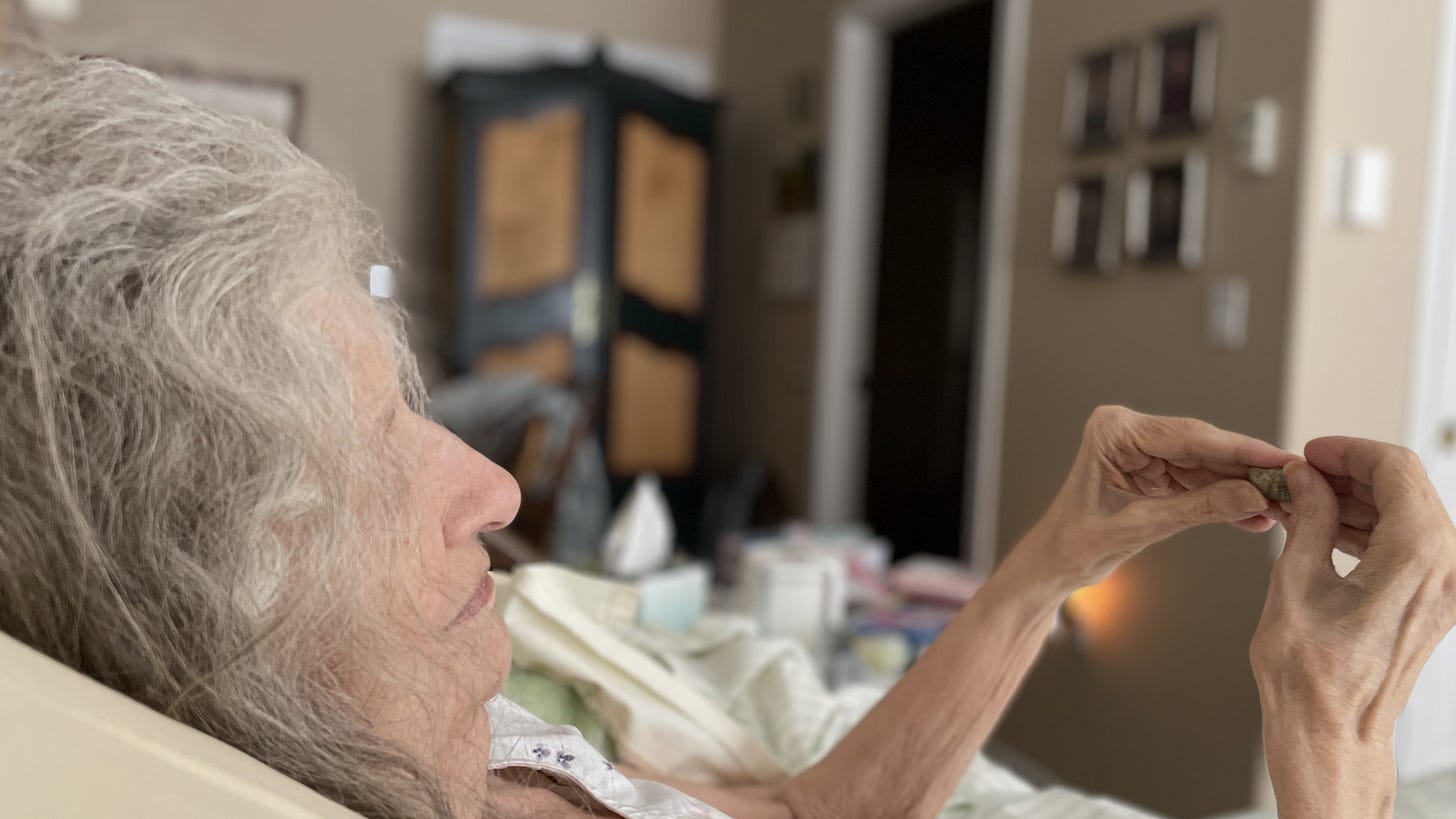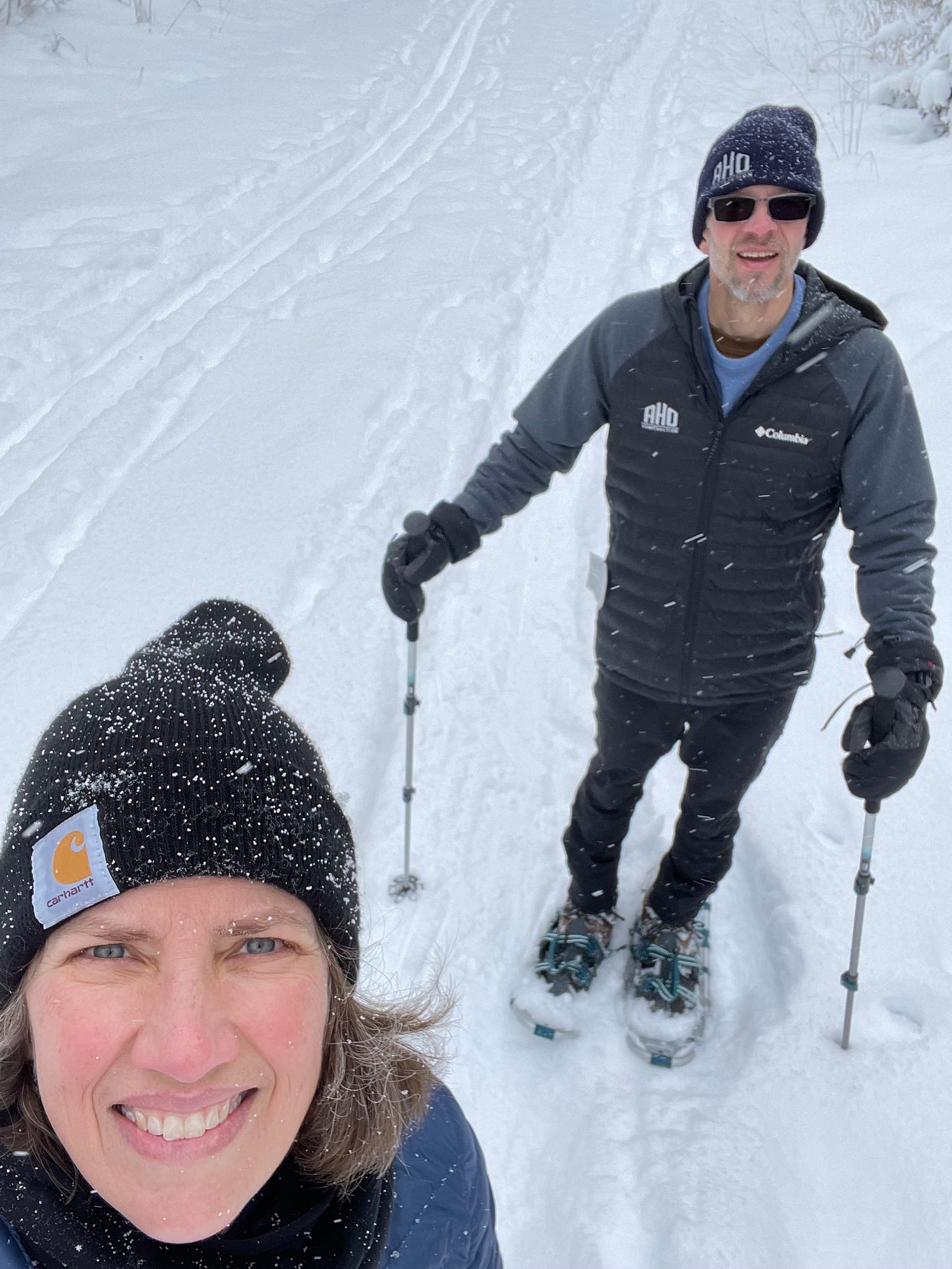Dear friends,
“A coward dies a thousand times before his death, but the valiant taste of death but once.”
—William Shakespeare, Julius Caesar
By Shakespeare’s definition, I am a world-class coward.
Before most people’s feet hit the floor in the morning, my mind has already imagined what might have gone wrong in the night and what disaster could hit in the day ahead. I’m a catastrophizer of the highest order.
My husband, Jon, is well aware of this. And he likes to insert my last name into different names and titles. Recently I purchased a book that’s been getting some buzz: Mostly What God Does: Reflections on Seeking and Finding His Love Everywhere by Savannah Guthrie. Jon says he’s going to write his own book called, Mostly What Coomber Does: Thinks About Dying.
My catastrophizing is not something new brought on by this Sandwich Season I’m in, worrying about multiple generations. As my mom would say, “’Twas ever thus.” I’ve been refining this habit for decades.
But here’s the flip side. I’ve also been told that most of what I write ends on an up note. Everything fell apart, but look what I got to learn!
It pains my catastrophizing heart to think I might sound like a cockeyed optimist. I’d rather like to think I’m a coward who drinks from a cup that is half full.
The truth
The truth is, I have days where the sheer length and diversity of my to-do lists and the paperwork I’m going through for multiple generations overwhelm me. Those are the days I grit my teeth, drop the f-bombs and actually watch wrinkles deepening like a miniature accordion between my eyebrows.

But even as I tackle my lists and fill out the forms, I am buoyed by the friends who check in on me.
Or I stop by my dad’s apartment for a chat, and as we reflect on our challenges, we start imagining all sorts of inappropriate ways we might describe them and songs that might apply (one favorite: Rodney Atkins’ “If You’re Going Through Hell”). Soon we’re laughing like people who have never wept.
Or my son, Max, sits down at the piano and spins out an improvisation that weaves together the theme song from the Transformers movie, Alan Walker’s “Faded” and Beethoven’s “Ode to Joy.” It’s like hearing a miracle rise out of my own living room.
The blessing-burden paradox
In my mind, life has become a blessing-burden paradox, because yes, the requirements of this past year-plus have been a burden. I’ve had to adult the hell out of so many situations. I’ve had to learn about umpteen different facets of aging, disability, living and dying. And I’ve had to acknowledge how intertwined they all are, how close to death we are at all times. And I wonder, How could I not have been aware of that before?
Yet, this terrifying awakening—what a blessing. I’m making peace with both life and death. I’ve spent more time with my family, getting to know them on different levels, working with them to solve problems and mysteries (login passwords, anyone?). I’ve learned to ask for help from friends and neighbors and people who work with seniors and people who work with disabilities, and strangers who have emerged to help us through every step of every challenge.
I say it has been “the worst best year” ever. Or “the best worst year” ever. Loss upon loss and blessing upon blessing, again and again and again.
But what separates the burdens from the blessings?
Recently Jon and I were driving to church, and because we were running late, we heard another church’s sermon start playing on the radio. I wasn’t paying attention until I heard the pastor say, “… if it is a burden and not a blessing, then most likely we are involved in a project, not a person …”*
And I thought, That! That is it. The times I have felt burdened are when I’ve focused on my to-do lists, when I’ve worried that I don’t know how to do something or whether I can complete it on time or in the right way.
The times I have felt blessed are when I’ve been caring for or simply being with another person—my mom, dad, son, husband, friends, strangers—and, of course, our pets.
The projects weigh me down. The people buoy me up. Yes, a thousand times yes.
What’s next?
I never would have asked for the stress and changes of this past year, nor the year before, nor even some before that.
And I’ve had moments where I’ve wondered if the sadness, frustration and stress might be the death of me. I actually have said out loud, “I might die of parenting.”
But odds are I won’t. And if I don’t die of parenting or of childing (or spousing), at least not in the short term, if life starts to settle down, if I have a longer runway to reach my end, it’s time to ask, as the poet Mary Oliver famously wrote, “what is it you plan to do with your one wild and precious life?”
Put another way, What am I going to live for? Or maybe, as Billie Eilish asks in her Barbie ballad, What was I made for?
Given all that has happened, all that continues to happen, I can’t help but think of how we are all headed in the same direction. We all need to start getting rid of our tea cups (see the bottom of last week’s post for that bit of Sandwich Season advice), because it’s only for a very brief time that any of us gets to continue looking down on the daisies before we start pushing them up.
That’s why this question of what am I going to live for has begun is evolving in my mind into another one: What am I willing to die for?
I’ve confessed my catastrophizer bent, but I think this question actually comes from a slightly different place.
It’s the realization that every joy, every sorrow, every delight, every moment brings us closer to the end. Every single day is a gift. And every gift costs.
One day I will die, for real. And if I’m lucky, I’ll have a few hours or days before that last breath to reflect on my life. What will I wish I had done less of? (Catastrophizing. Watching bad sitcoms in the ‘90s. Getting frustrated when Jon throws out the doodad I planned to use for a project.) What will I wish I had done more of? (Filing my papers and bills so they’re not a burden to someone else. Burning a few journals from my angry years. Taking time to walk with my mom in her garden.)
And I will think about what I am thankful for: my family and friends, the opportunity to connect with people through writing and playing music, the delight of moving my body—skiing, running and yoga—and eating chocolate chips and Costco Aussie Bites.
In my final moments, I believe I will think of all these things and more, and I will say to myself, yes, each of these things cost me my life, and all of them were worth dying for.
And maybe—dangit, this ending is upbeat, isn’t it?—maybe it took this sandwich season for me to really understand the precious value of each moment we get to be alive.
All my best to you and yours,
Sarah
* I got in touch with the pastor who was speaking on the radio—Andy Veith at Fargo’s Bethel Church—and he shared with me his full quote from that sermon:
“Joseph Stowell said it best, “If Christianity is dull and boring, if it is a burden and not a blessing, then most likely we are involved in a project, not a person—a system not a Savior, rules rather than a relationship.”
Thank you
This past week brought my 300th subscriber to Sandwich Season. Also this week I heard the saying, “Grief shared is halved. Joy shared is doubled.”
I’m not sure how the math works, but sharing my experiences with 300 people has certainly helped me feel less alone in this season of life.
Thank you for joining me in this journey and for your emails, comments and likes that remind me none of us is alone in any of this.
May you experience much more joy than grief and have many opportunities to share it all.







'And I’ve had to acknowledge how intertwined they all are, how close to death we are at all times. And I wonder, How could I not have been aware of that before?'
Yes so true! Some simple (and big!) truths you know because you've heard them, but don't ~understand~ until you've ~learned~ them.
LOVE this one… well, I love all of what you write but this one hit me smack dab in the middle of my aging forehead! ♥️